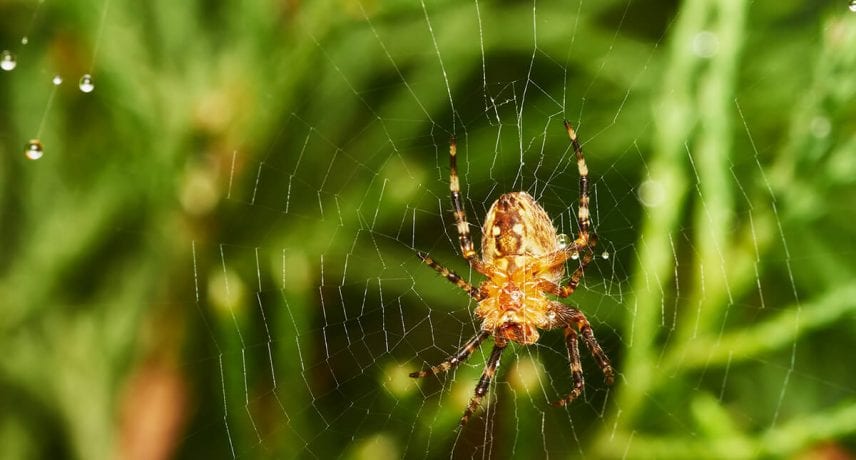The vast majority of spider bites are not dangerous to people. The venom harms other insects, but humans are either too big or we don’t have the proper genes to be harmed by the venom. Even in cases of very dangerous spiders like the Black Widow, the vast majority of folks will survive a bite. That doesn’t mean that the experience will be pleasant.
Many spiders produce neurotoxins that they inject in their prey. This severely debilitates them and allows them to move in for the kill. However, spiders don’t consider humans prey. We’re too big and too unpredictable. They will bite, however, if they feel threatened.
If spiders have become a problem in your home, the spider control experts at Pointe Pest Control can take a look at what’s drawing them there and devise a strategy to keep them out.
The Real Danger Of Spider Bites
In the United States, there are two spiders that can cause serious harm to humans. Those are the Black Widow and the Brown Recluse. They both produce a very strong venom. When spider bites are fatal, it’s generally in those who are very young or very old. Additionally, those with compromised immune systems are at greater risk of death or having a seriously bad reaction.
That’s because, in many cases, it’s the post-bite infection that does the most damage. In the case of the Black Widow spider, the venom contains a powerful paralytic. In some cases, it will be difficult for individuals to breathe after being bitten by the Black Widow due to partial paralysis of the diaphragm. If you’ve been bitten, it’s imperative to seek medical treatment immediately.
Diagnosing A Spider Bite
It’s difficult for even trained professionals to diagnose spider bite symptoms based on the bite alone. Spider bites present a unique challenge for doctors. While this is only true in cases where the bitten didn’t see the spider, it’s nearly impossible for a doctor to make a determination that your symptoms are tied to a spider bite just by looking at the bite. This is, once again, because spider bites present as larger red boils on the skin. They get worse over time because they get infected. However, many conditions can cause that kind of infection.
Black Widows will leave characteristic double puncture wounds where their fangs bit into your skin. However, Brown Recluses are much more difficult to diagnose.
Symptoms Of The Black Widow Spider Bite
The Black Widow spider is the most venomous in the United States. The venom contains a powerful neurotoxin that causes a systemic reaction. It interferes with your brain’s ability to communicate with your muscles. Symptoms include:
- Twin fang marks on the bite location,
- Flu-like symptoms (fever, sweating, chills, muscle cramps),
- Headache and dizziness, and
- Racing heart and exhaustion.
Symptoms Of The Brown Recluse Spider
Doctors use a mnemonic device to rule out the Brown Recluse. Conveniently, it’s NOTRCLUSE:
- (N)umerous – If there is more than one lesion, it’s not a Brown Recluse bite.
- (O)ccurence – The Brown Recluse has specific habits. It generally likes to hide out in clothing, closets, under boxes, and in dank, dark places. If the bite occurred while you were gardening, you’re probably not dealing with a Brown Recluse.
- (T)iming – The bite will generally occur between April and October.
- (R)ed center – Brown Recluse bites are generally not red. They’re pale, blue, or purple.
- (C)hronic – Brown Recluse bites should clear up within 3 weeks to 3 months.
- (L)arge – Recluse bites produce necrosis that is no larger than 4 inches.
- (S)wollen – Brown Recluse bites do not swell, they sink or remain flat.
- (E)xudes moisture – Brown Recluse bites are dry, not wet. If you have pus, it’s an infection.
Treating A Spider Bite Yourself
Unless you’ve been bitten by a Black Widow, in which case you should seek immediate medical attention, you can usually treat the bite area yourself. You will want to clean the area with soap and a warm compress and then apply triple antibiotic ointment and bandage over the bite. The largest problem with most spider bites is the potential for infection. When necrosis (skin death) does occur, it’s because the bite hasn’t been treated properly. If symptoms worsen over a 24-hour period, seek medical care.
Allergic Reactions To Spider Bites
Allergic reactions are always a possibility with any type of bug bite. If you know that you are allergic, you need to be aware of that and carry an EpiPen with you at all times. Symptoms of anaphylaxis include: Hives, shortness of breath, wheezing, and general overall weakness.
Local Spider Control Experts Will Fortify Your Home
Pointe Pest Control offers top-quality spider control options. Talk to us today to set up an appointment.


